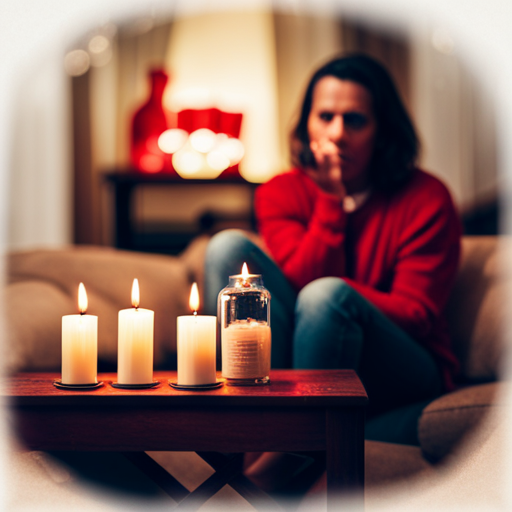This article explores the possibility of individuals developing allergies to scented candles. It delves into common symptoms that can arise from exposure to candles, including skin irritation and respiratory issues.
The article also discusses the potential link between fragrance oil allergies and candle-related allergies.
Additionally, it highlights the importance of candle safety and proper ventilation to minimize adverse effects.
With market trends towards safer candle options, this article aims to provide insights and recommendations for allergy-prone individuals.
Key Takeaways
– Allergies to scented candles can cause skin irritation, itching, and redness.
– Exposure to excessive amounts of candle smoke, even from unscented candles, is a health hazard.
– Existing health conditions or allergies may be aggravated by scented candles, except for unscented ones.
– Fragrance oils in candles can cause hay fever symptoms in sensitive individuals.
Common Symptoms of Candle Allergies

https://www.youtube.com/watch?v=TasPUUyFi9o
Some common symptoms of candle allergies include skin irritation, itching, and redness, as well as a runny nose and watery eyes similar to hay fever. When exposed to the chemicals and fragrances emitted by candles, sensitive individuals may experience these allergic reactions.
The skin may become irritated, itchy, and red, especially if there are perfumes or chemicals present in the candle. In addition, the respiratory system may be affected, leading to a runny nose and watery eyes. These symptoms can be similar to those experienced during hay fever, caused by allergens such as pollen.
It is important for individuals with candle allergies to avoid scented candles and opt for unscented alternatives to prevent these uncomfortable symptoms.
Understanding Fragrance Oil Allergies

Fragrance oils, commonly used in natural fragrances, can potentially trigger hay fever symptoms in individuals with sensitivity. These oils are often found in scented candles, making them a possible cause of allergies for some people. The table below provides an overview of fragrance oil allergies and their symptoms:
| Allergies to Fragrance Oils |
|---|
| Stuffy or runny nose |
| Itchy nose |
| Potential allergy |
Individuals with these symptoms, even when burning organic beeswax candles, should be aware of the possibility of fragrance oil allergies. It is important to note that some candles aim to reduce the negative health effects of artificial fragrances and organic compounds. By using unscented candles and practicing proper candle safety, individuals can avoid candle allergies and enjoy the ambiance without compromising their health.
The Link Between Soap and Perfume Allergies

The potential link between soap and perfume allergies raises concerns about the impact of candle burning on individuals with fragrance sensitivities. Perfumes contain essential oils and other ingredients that can cause allergies. People with perfume allergies should consider the impact of candle burning on their health.
Perfumes often contain a chemical formula with multiple essential oils and synthetic scents. Soaps are made from natural ingredients but can be dangerous if not manufactured correctly. Soap allergies can occur due to protein sensitivity and intolerance.
Traditional non-scented candles do not typically trigger candle allergies. However, mishandling standard paraffin candles can pose a fire risk. Some fragranced candles are known to attract mice. Candle allergies can be avoided by using unscented candles and practicing proper candle safety.
Fire Risk and Candle Safety

Mishandling candles can pose a fire risk, making proper candle safety crucial. To ensure a safe environment, individuals should follow these guidelines:
– Always keep candles away from flammable materials.
– Never leave a lit candle unattended.
– Trim candle wicks to a quarter of an inch before lighting.
– Place candles on a stable and heat-resistant surface.
– Keep candles out of reach of children and pets.
– Extinguish candles before leaving a room or going to sleep.
– Use candle holders that are specifically designed for the size and type of candle.
– Avoid placing candles near drafts, as they can cause uneven burning or flare-ups.
Exploring Market Trends and Safety Measures

To stay updated on the latest market trends and ensure safety, individuals can explore new candle options that prioritize health and well-being.
In recent years, there has been a growing demand for candles that minimize the negative effects of fragrance oils and synthetic compounds. Some manufacturers have introduced candle wax formulations aimed at reducing potential health risks associated with candle emissions. These candles are designed to be safer for individuals with allergies or existing health conditions.
Additionally, proper care and ventilation can help minimize the impact of candle emissions on overall well-being. It is important to note that toxic chemicals in candles are rare, but individuals should be cautious when purchasing from cheap or off-brand manufacturers.
Choosing the Right Candle for Allergy-Prone Individuals

After exploring the market trends and safety measures associated with scented candles, it is important to consider how to choose the right candle for individuals with allergies.
– Opt for unscented candles: Unscented candles provide a safer option for those prone to allergies or existing health conditions. They do not contain irritating fragrances that can trigger symptoms.
– Look for natural ingredients: Candles made from natural ingredients, such as organic beeswax or soy, can be less likely to cause allergies compared to those containing synthetic compounds.
– Consider hypoallergenic options: Some candle manufacturers create hypoallergenic candles specifically designed for individuals with sensitivities. These candles aim to minimize the negative health effects of artificial fragrances and other potential irritants.
Managing Candle Allergies: Tips and Recommendations

Using unscented candles and practicing proper ventilation can help manage candle allergies and minimize the negative health effects of candle emissions.
Allergy symptoms such as skin irritation, itching, and redness can be caused by perfume, soap, or chemicals in candle emissions. Even unscented candles can emit excessive amounts of smoke, which is a health hazard.
Scented candles, except for unscented ones, can aggravate existing health conditions or allergies. Fragrances in candles can also cause a runny nose, watery eyes, and excessive tearing.
While candle allergies are unlikely to cause anaphylaxis, they can still be bothersome and should be managed with care. Some candles aim to reduce negative health effects by using natural fragrances or organic compounds. It is also important to consider allergies to perfume and soap when using scented candles.
Can Making Bleach Scented Candles Cause Allergic Reactions?
When considering bleach scented candles safety requirements, it’s important to be cautious of potential allergic reactions. The strong scent of bleach can be irritating to some individuals and may trigger allergic symptoms. It’s essential to follow safety guidelines when handling or using these types of candles to minimize any potential risks.
Frequently Asked Questions
Can Scented Candles Cause Anaphylaxis?
Scented candles can cause allergic reactions, but anaphylaxis is unlikely. Symptoms such as skin irritation, itching, and watery eyes may occur. Using unscented candles and practicing proper candle safety can help minimize the risk.
Are There Any Specific Fragrance Oils That Are Less Likely to Cause Allergies?
Some fragrance oils may be less likely to cause allergies, but further research is needed. It is important for individuals with allergies to be cautious when using scented candles and opt for unscented options.
What Are Some Common Ingredients in Perfumes That Can Trigger Allergies?
Some common ingredients in perfumes that can trigger allergies include essential oils, synthetic scents, and chemical formulas. People with perfume allergies should consider the impact of candle burning on their health.
Can Soap Allergies Be Caused by Synthetic Scents?
Soap allergies can be caused by synthetic scents. Certain ingredients in soaps, such as fragrance oils and synthetic scents, can trigger allergies in sensitive individuals, leading to symptoms like skin irritation and itching.
Are There Any Specific Safety Measures to Consider When Burning Scented Candles?
There are specific safety measures to consider when burning scented candles. Proper care and ventilation can minimize the negative effects of candle emissions, making unscented candles a safer option for those with allergies or health conditions.

